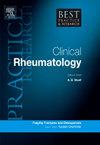镰状细胞病的肌肉骨骼并发症:病理生理学、诊断和管理。
IF 4.8
2区 医学
Q1 RHEUMATOLOGY
Best Practice & Research in Clinical Rheumatology
Pub Date : 2025-05-01
DOI:10.1016/j.berh.2025.102033
引用次数: 0
摘要
镰状细胞病(SCD)是一种单基因疾病,引起慢性溶血、贫血和血管闭塞,导致肌肉骨骼并发症,如骨坏死、骨质疏松和骨折,影响50-70%的SCD患者。这些并发症是遗传和生理因素复杂的相互作用的结果,包括血红蛋白生成异常、慢性炎症和氧化应激。这篇综述讨论了SCD中肌肉骨骼并发症的病理生理学、临床前症状和临床表现,以及目前的治疗选择,包括药物干预、外科手术和骨髓移植。早期发现临床前症状对于防止病情恶化至关重要。药物干预(止痛剂、抗炎剂、骨修饰剂和羟基脲)、手术干预(核心减压、植骨、关节置换和截骨)和支持措施可增强活动能力、力量和幸福感。多学科方法对于最佳护理至关重要,早期诊断和管理对于预防长期损害和改善结果至关重要。未来的研究方向包括靶向治疗、生物标志物研究和基础设施建设,以改善SCD患者肌肉骨骼并发症的预后。本文章由计算机程序翻译,如有差异,请以英文原文为准。
Musculoskeletal complications in sickle cell disease: Pathophysiology, diagnosis and management
Sickle cell disease (SCD) is a mono-genic disorder causing chronic hemolysis, anemia, and vaso-occlusion, leading to musculoskeletal complications such as osteonecrosis, osteoporosis, and bone fractures affecting 50–70% SCD patients. These complications result from a complex interplay of genetic and physiological factors, including abnormal hemoglobin production, chronic inflammation, and oxidative stress. This review discusses the pathophysiology, pre-clinical symptoms, and clinical manifestations of musculoskeletal complications in SCD, as well as current treatment options, including pharmacological interventions, surgical procedures, and bone marrow transplantation. Early detection of pre-clinical symptoms is crucial to prevent progression. Pharmacological interventions (analgesics, anti-inflammatory agents, bone-modifying agents and hydroxyurea), surgical interventions (core decompression, bone grafting, joint replacement and osteotomy) and supportive measures enhance mobility, strength and well-being. A multidisciplinary approach is essential for optimal care, and early diagnosis and management are crucial to prevent long-term damage and improve outcomes. Future research directions include targeted therapies, biomarker investigation and infrastructure development to improve outcomes for SCD individuals with musculoskeletal complications.
求助全文
通过发布文献求助,成功后即可免费获取论文全文。
去求助
来源期刊
CiteScore
9.40
自引率
0.00%
发文量
43
审稿时长
27 days
期刊介绍:
Evidence-based updates of best clinical practice across the spectrum of musculoskeletal conditions.
Best Practice & Research: Clinical Rheumatology keeps the clinician or trainee informed of the latest developments and current recommended practice in the rapidly advancing fields of musculoskeletal conditions and science.
The series provides a continuous update of current clinical practice. It is a topical serial publication that covers the spectrum of musculoskeletal conditions in a 4-year cycle. Each topic-based issue contains around 200 pages of practical, evidence-based review articles, which integrate the results from the latest original research with current clinical practice and thinking to provide a continuous update.
Each issue follows a problem-orientated approach that focuses on the key questions to be addressed, clearly defining what is known and not known. The review articles seek to address the clinical issues of diagnosis, treatment and patient management. Management is described in practical terms so that it can be applied to the individual patient. The serial is aimed at the physician in both practice and training.

 求助内容:
求助内容: 应助结果提醒方式:
应助结果提醒方式:


